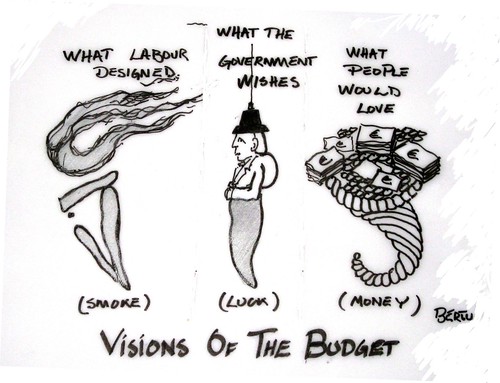With a title like that, you’d think I’m about to kick off a whole song and dance about the “living wage” and “cost of living” and whatever other index the latest fad is in that ever so exciting corner of the universe where popular (and populist) politics crosses with economics. Nae wurries, I ain’t. The pros and cons of whether a particular wage is sufficient to get along with one’s daily life are undeniably important building blocks of a right and proper political manifesto, but what concerns me here is the return of a very noxious notion in our political constellation: the comparative analysis of earnings intended for political vantage.
It all began a few weeks ago with a seemingly innocent question that has already been dealt with in a previous column. Some smart job from the Opposition benches queried how many people in the public sector earned more than the President of Malta. The problem I had with that question at that point was precisely with the “why”. I would have loved to ask the poser of aforementioned parliamentary question: “What’s your point?” My concern was that we were being presented with the gory Trojan horse that is the mother of all evils (if not mother then a not too distant relative) in Maltese mentality, one that summarily aborts any potential for progress.
In Maltese we have a word for it − “għira” − that somehow carries much more weight than “jealousy”, as used in the language of the student-rattled Charles and Camilla. It’s the għira that features in the car sticker literal translation urging readers to “Stuff Your Jealousy” − one that can be transformed into a full blown profession “għajjur” (one who is prone to be jealous). The għira is coupled with a very local version of socialist justice that is based on the premise of “if you have one then there is no reason in the world why I should not have one too”. I may be wrong but to me this is the socialism à-la-Mintoff: that scythe of socialist ignorance that culls all progress at birth in order to keep everyone equal. Equally ignorant. Equally thrifty. Equally redneck. (Bir-rispett kollu − With all due respect).
Raise your glass
We are currently living in the Age of Garfield. It’s the Age of the Fat Cats who have a bit of a problem with the għira definition of things. Most of the times that’s because the fingers of the għira-espousing population are pointed at them in the most unqualified of manners (when they are not showing them fingers of another sort). The Fat Cats are, economically speaking, at the other extreme of the political spectrum. They delude themselves that they are revitalising and regenerating a limping economy, only to slip heavily at certain moments during which they give the impression of baking pies for their own consumption.
Torn between the Fat Cat and the Mintoffian Scythe, the citizen and voter is constantly being handed rules and standards with which to assess who to trust with the reigns of governmental planning come next election. Which is where the latest fad comes in with the noise of a raucous Maltese crowd on a package tour in some market at Misterbianco (Sicily). First it sounded like a TV programme gone wrong: “Who Wants to Earn More than Malta’s President?” and now we have the Mintoffian reaction to the Fat Cat gaffe: “Who Wants to Renege on A Salary Raise this Christmas?”.
And it’s hard to guess who is the Grinch. Is it the Scrooges on the Fat Cat benches who back then, during the highest wave of the economic crisis tsunami, showed the sensitivity of a born again Christian on a Xarabank panel and voted themselves a raise? Is it the Leader of the Opposition who, once he was informed of the impending (backdated) raise was obliged to the extremes of utmost abnegation and in an ironic twist of quasi-Thatcherite repartee, declares “This man is not for selling”? Is it the press who pounced upon initiatives in foreign parliaments (notably Ireland and Czech Republic) and reported their respective decisions to REDUCE their salary in times of economic hardship?
Bad Moon Risin’
Whoever the Grinch may have been, we were suddenly transported into the realm of salary comparisons and comparatives. Now there is no doubt whatsoever in my mind that the Cabinet voting itself a raise during a period when − independently of the real economic climate − all political talk and newspeak is heavily concentrated on the notion of Hard Times is a huge faux pas for any government to commit. I also can understand Joseph Muscat’s argument of “I will not be bought”, for by including all MPs in their bumbling pay rise it is obvious that Cabinet hoped to convince the socialist progressives to keep mum thanks to the proffering of a chunk of the pie.
So let it not be said that J’accuse is here defending the timing of the salary rise per se. We do have a bone to pick though on the issue of “the values of salaries” in discussing merits and demerits. In a way, Joseph Muscat, the prime critic of the latest rise, seems to have considered this issue from a sensible vantage point when he seemed to be prepared to consider an option for MPs to choose between Part Time and Full Time. Much as I find this suggestion ludicrous, for reasons I shall explain later, it does show that for a fleeting moment Muscat was actually looking beyond the salary itself and thinking in terms of the work it justifies.
For the problem here, you see, is that I tend to view jobs on the basis of performance. On the scale of merit, performance is translated into salary and not vice-versa. You do not go out on the job market looking for a salary but you look for a job. In most cases you find that salaries are appended towards the end of a job announcement and are expressed in the form of minimum and maximum possible salary. Why? Because the salary depends on a multiplicity of criteria linked to “merit” such as education, experience and specialisation.
Rise to the occasion
Maybe I am not sufficiently clear (I admit that’s the case quite often). Just let me go back to the PQ about presidential earnings. When I ask “What’s the point?”, I mean how can the President’s salary become a standard measure to assess qualification for a job? What will we ask people who aspire to a salary that trumps that of San Anton’s resident? “Can you hop on one leg more times than George Abela?” “Can you run the mile in less time than George?” How exactly does this value of salarial comparison fit in?
According to the press, the salary of an MP post-raise will be €26,000 per annum. Shall we play the comparison game? An entry-level grade job at an EU institution (AST1) will earn around €2,500 per month in hand. By November of any given year, your average administrative assistant in an EU institution will have earned more than Karl Gouder (random MP) will earn from his parliament salary in a year. Your average employee in the EU translation services will earn around €4,500 a month (there’s a scale there too based on experience, length of service and specialisation) which puts them at around two Malta MPs worth on the socialist salary value scale.
There are enough Maltese translators in Luxembourg to be able to fill Parliament twice over. Shall we do that? After all, if they earn almost as much as two MPs put together they surely must be worth the while. Which brings me back to Joseph Muscat’s part-time/full-time dilemma. We have already experienced a national football team with a mix of pros, amateurs and part-timers, so why not a Parliament with part-timers then? Well the main point, and what nobody seems to be asking, is: “what kind of performance do we expect from our parliamentarians?”
Those great expectations
The value of salaries distracts us from this question. We discuss pounds, shillings and pence when we should be wondering whether we are being short-changed in the business of political representation. As I said on my blog, I find it easy not to be impressed by Joseph Muscat’s show of abnegation and self-denial. Whether he refuses a salary raise, or independently decides to half his current salary is of no consequence to me or any other citizen if he continues to fail to come up with concrete politics that show a new politics and direction.
It’s not the whinge of the eternal wait for a decent Opposition. It’s worse than that. This week Joseph Muscat showed us the full force of his new politics when he compared Labour’s harbouring of “capo dei capi” Gatt as a special delegate to some drug trafficker (Norman Bezzina) who was a member of a Nationalist minister’s private secretariat. As the poet sings “That’s all right, because I like the way you lie.” Next: Even Robin Hood was an outlaw.
Judging by Facebook and comments on the online news, it seems that this PLPN strategy works. They feed the minions the values with which they want us to judge them and we thankfully grovel in humble acceptance. I was expecting a movement for the beatification of Inhobbkom Joseph − our new saviour from those perfidious bumblers in government − any day now. We were dared to criticise his quasi-saintly move of sacrifice in these times of hardiness. He would not tell us to eat cake and would share humble pie around our poor man’s table. A saint before being a man.
Cut through the bullshit and the spin and you might remember that this is the man whose alternative budget leaked everywhere. The saving grace for Muscat’s alternative budget was Bondi’s hash of an unprofessional programme (the BA’s words not mine). In the short-sighted public calculation, the equation must have been simple. If Bondi was wrong then Muscat is right. Which is not the case. Yes, Bondi was unprofessional but that does not make Muscat’s alternative budget any better. It is still based on populist calculations that will not necessarily take us anywhere other than into more socialist-scythe style mire. Blessed are we to have such alternatives to the fat cats in government.
Uprisin’
And while PM Gonzi was carried aloft on the hands of our future consumers of governmental pie − those who have already been well bred to fill the ranks without nary a questioning mind − back in London students rattled and shook the car containing the heir to the realm and his madam. The surreal images of the (definitely unplanned) photo op outside Castille contrasted heavily to the rioting students in Parliament Square. They’d like to tell us that our students have it all good and that this government is still investing heavily in education.
Sure, but what values are we imparting to today’s unquestioning youth? Hold on. Maybe I know the answer to that one. If you’re going to lick and squirm your way into a job via the approved channels, make sure the salary is better than that of George Abela… and Bob’s your uncle.
Toasts
I’m raising a glass to Ronnie and Nathaniel this Sunday. Happy birthday to both. It’s the last Sunday before the Christmas holiday season really kicks in. Weather permitting (and that is half a prayer actually), the next missive will be typed from my second home in Paceville… Meanwhile I’m off to find out what Santa gets paid this Christmas.
www.akkuza.com is a non-profit, free blog full of punditry worth reading. It’s worth millions in intellectual property so plant your tent in a corner of the comment section any time you want.





